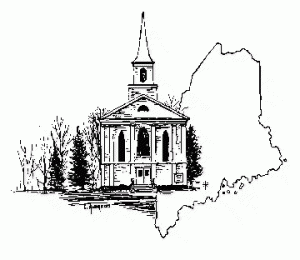Home church of first MEC foreign missionary

Methodism in Hallowell dates from October 13, 1793, when Jesse Lee preached in the town. This was probably the first Methodist sermon ever heard in the Kennebec region of Maine. In 1800, a revival was held by Epaphras Kibby, and the first two converts, Charles and Martha Cox, had their infant twins, Melville and Gershom, baptized.
The Cox family was active in the Methodist Society from its beginning. The Hallowell Church began as a Methodist chapel, constructed around 1802. Melville Cox grew up in the chapel and began preaching by the time he was twenty years old. In March 1821 he was licensed to preach by the Kennebec District Conference, and received his first appointment in 1822. Ill health, however, forced Cox to return to Hallowell in 1825.
During that same period, the church members decided to build a new sanctuary. Melville Cox became secretary of the group of men elected to find and purchase the land for the new church. His handwritten minutes and the deed (signed by Cox) still exist.
Cox moved south in November 1826 to avoid the Maine winter and hopefully recover his health. He preached off and on until 1828, when he married and located. During the next two years he was editor of The Itinerant in Baltimore, until his wife’s death in December 1830. Cox returned to the ministry, although his health was still fragile.
By mid-1831 Cox had become interested in missions. The Methodist Episcopal Church had formed a Missionary Society in 1819, but no suitable foreign missionary had yet been found. Cox offered himself to Bishop Elijah Hedding for the South American field. Instead, Hedding asked if he would go to Liberia, established on Africa’s west coast for freed American slaves.
Cox sailed from Norfolk on November 6, 1832, arriving in Monrovia on March 8, 1833. He held camp meeting, started regular worship and Sunday school, and developed mission strategies all within a few weeks of his arrival, but his health was simply not up to the task, and he died of malaria on July 21, 1833 after three months of decline.
Although his career was painfully brief, Cox’s story inspired many in the early missions movement. Before he sailed for Liberia, Cox told a friend that should he die in Africa, the friend should write his epitaph. What, asked the friend, should the epitaph say? Cox replied, “Let a thousand die before Africa be given up.”
Taken with permission from Heritage Landmarks: A Traveler’s Guide to the Most Sacred Places in The United Methodist Church, by the General Commission on Archives and History. For more information, see http://www.gcah.org/research/travelers-guide/cox-memorial-united-methodist-church




